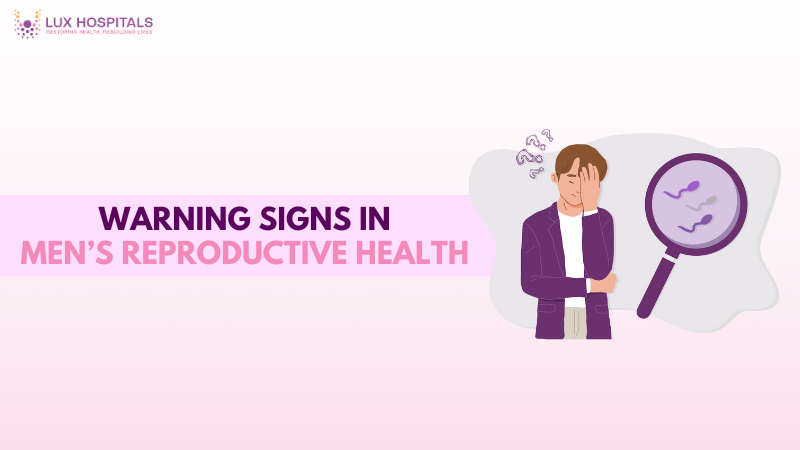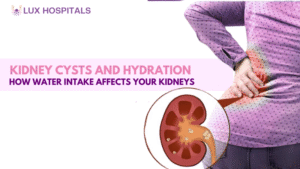Men Health Warning Signs: When to Seek Help for Reproductive, Prostate, or Sexual Issues

When it comes to overall well-being, men often ignore subtle health cues, especially those related to reproductive, prostate, or sexual function. These issues may feel private or even embarrassing, but recognizing men health warning signs early can be life-saving. This blog discusses essential warning signs you shouldn’t overlook and offers advice on when to get medical attention.
Understanding the Importance of Men Reproductive Health
Men reproductive health isn’t just about fertility, it’s a window into your hormonal, urinary, and systemic health, infections, sexually transmitted diseases, or even cancer, which may be indicated by early dysfunctional symptoms such as pain, swelling, or discharge. Prompt diagnosis and treatment are ensured by identifying men reproductive health warning indicators.
Warning Signs
- Testicular pain or swelling
- Unusual lumps or bumps
- Painful ejaculation
- Blood in semen
- Decreased libido or sexual drive
Each of these symptoms can be connected to underlying conditions like orchitis, varicocele, testicular cancer, or hormonal imbalances. Regular self-exams and annual checkups are key.
Prostate Health: Why It Matters at Every Age
The prostate is a small gland that plays a significant role in male reproductive health. As men age, the prostate can become enlarged, infected, or even cancerous. Understanding men health warning signs related to the prostate helps prevent long-term complications.
Common Symptoms of Prostate Issues:
- Frequent urination (especially at night)
- Weak or interrupted urine flow
- Pain during urination or ejaculation
- Blood in urine or semen
- Lower back or pelvic pain
Prostate cancer, prostatitis, and benign prostatic hyperplasia (BPH) all share overlapping symptoms. A PSA (prostate-specific antigen) test, digital rectal exam (DRE), and imaging can clarify the cause.
Sexual Health: A Mirror to Your Body’s Overall Condition
Sexual dysfunction isn’t just a bedroom issue it’s often an indicator of vascular, hormonal, or psychological problems. Low libido, early ejaculation, and erectile dysfunction (ED) are common and treatable. Serious health issues may arise if you ignore men health warning flags during your sexual activity.
Sexual Dysfunction Symptoms Include:
- Trouble getting or maintaining an erection
- Reduced sexual desire
- Premature or delayed ejaculation
- Pain during intercourse
ED, for example, may be linked to heart disease, diabetes, or depression. Getting to the root cause can dramatically improve both your sex life and your overall health.
When to See a Doctor?
Early intervention is key. You should see a healthcare provider if:
- Symptoms persist for more than a week
- Pain intensifies or spreads
- You notice blood in your urine or semen
- There are changes in sexual function or ejaculation
Delaying care could lead to complications like infertility, chronic pain, or advanced-stage cancer. Taking action when you notice men health warning signs gives you the best chance to recover fully.
Preventive Steps to Protect Your Health
Even if you’re asymptomatic, these steps can help:
- Get regular checkups, especially after age 40
- Practice safe sex
- Keep up a healthy diet that is high in zinc and antioxidants
- Exercise regularly
- Avoid tobacco and limit alcohol
Preventive care is still one of the most effective strategies for avoiding severe conditions. Recognize and respond to men health warning signs before they escalate.
Conclusion
Health isn’t just the absence of disease, it’s about thriving. The sooner you identify and address men health warning signs, the greater your odds of maintaining an active, fulfilling life. Don’t wait. Book that appointment, start the conversation, and prioritize your health above all else. The earlier you act, the more treatment options you’ll have and the better your outcomes will be. Remember, ignoring men health warning signs won’t make them go away it only gives them time to get worse. So stay aware, stay proactive, and take charge of your health journey with confidence.
Frequently Asked Questions
Common signs include testicular pain, swelling, lumps, changes in ejaculation, and low libido. These symptoms may indicate infections, hormonal imbalances, or even cancer. Early medical attention can prevent long-term complications and improve fertility.
Men should begin regular prostate screening at age 50 or earlier if there's a family history of prostate cancer. Screening includes a PSA test and a digital rectal exam (DRE). These tests can detect abnormalities even before symptoms arise.
Yes, erectile dysfunction can be a sign of underlying conditions like cardiovascular disease, diabetes, or low testosterone. It is not just a sexual issue but often a systemic health warning. Timely treatment can significantly improve both quality of life and longevity.
In many cases, yes treatment may include medication, lifestyle changes, or surgical correction of anatomical issues. A semen analysis is usually the first diagnostic step. Identifying the cause of infertility is key to successful treatment.
Symptoms include pelvic pain, painful urination, frequent urination, and sometimes fever or chills. A doctor may confirm the diagnosis through urine tests and a prostate exam. Treatment typically involves antibiotics and pain management.
Blood in semen, or hematospermia, can result from infections, inflammation, or trauma. While often benign, it can sometimes signal more serious conditions like cancer or STDs. A doctor can perform imaging and lab tests to determine the cause.sex hormone levels and suggest appropriate treatment.





















